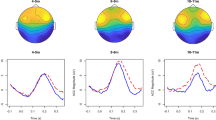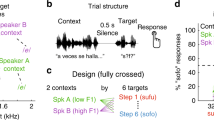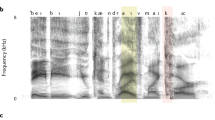Abstract
IT has been known for some time that vowels are distinguished from one another mainly by the frequencies of the formants or regions of the auditory spectrum in which there is a comparatively large amount of energy. Recently, the hypothesis has been put forward by Joos1 that when a listener identifies the vowel in a particular word he does so not by considering the absolute value of the lowest two formant frequencies, as was previously thought, but by assessing the frequencies of these formants in relation to the formant frequencies of other vowels which he has heard pronounced by that speaker. On this hypothesis, the identification of a particular sound depends on the acoustic structure of the neighbouring sounds.
This is a preview of subscription content, access via your institution
Access options
Subscribe to this journal
Receive 51 print issues and online access
$199.00 per year
only $3.90 per issue
Buy this article
- Purchase on Springer Link
- Instant access to full article PDF
Prices may be subject to local taxes which are calculated during checkout
Similar content being viewed by others
References
Joos, M., “Acoustic Phonetics” (Language Monograph No. 23; 1948).
Vernon, M. D., “A Further Study of Visual Perception” (Cambridge, 1952).
Helson, H., Amer. J. Psychol., 60, 1 (1947).
Author information
Authors and Affiliations
Rights and permissions
About this article
Cite this article
BROADBENT, D., LADEFOGED, P. & LAWRENCE, W. Vowel Sounds and Perceptual Constancy. Nature 178, 815–816 (1956). https://doi.org/10.1038/178815b0
Issue Date:
DOI: https://doi.org/10.1038/178815b0
Comments
By submitting a comment you agree to abide by our Terms and Community Guidelines. If you find something abusive or that does not comply with our terms or guidelines please flag it as inappropriate.



